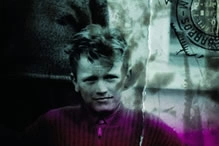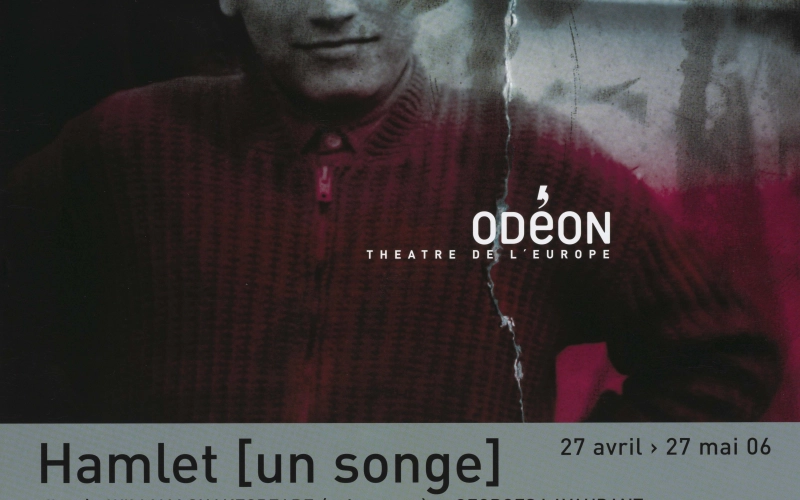Hamlet [a Dream]
April 27 2006 to May 27 2006
A dream, just a dream. A bit in the way Godard said, "just an image". Not Shakespeare's truth, nor always his words, nor his photographic portrait, but a reverie that is the daughter of his images and accompanies them. Not Shakespeare's dream, but a voyage among others through a work/world, after one of Georges Lavaudant's writers of preference. Lavaudant, who has already staged King Lear, Hamlet, Richard III, Coriolanus and who, until spring of 2005, had never ventured into the Shakespearean comedies. In the fall of 2004, the new performance of The Rose and The Axe and the reunion with Ariel Garcia Valdès led Lavaudant to renew contact with the big cats of Elizabethan theater. And then, several months later, invited by Claude Stratz, director of the National Conservatory of Dramatic Art, the Odeon director staged eleven young actors in a two hour show entitled, Dream, Tempest (the first play was included in the second).
These two experiences - a return to the sources of his own theatrical engagement, an advance towards a repertory he didn't know - awakened in him the desire to dive into Shakespeare again. Which doesn't necessarily mean to concentrate exclusively on this or that of his plays, even if Lavaudant still reserves the possibility, but first of all taking the time to follow his intuition, to let himself have a chance to mature, by letting himself be led by certain main themes that we feel working throughout the entire play. Because it's well known that Shakespeare isn't only a tremendous dramatic architect, capable of arranging the most varied plots on every tone or combining stories from diverse sources to create a profoundly unified text (as in King Lear, which André Engel will stage this season and offers a striking example of this). He isn't only the most prolific and powerful of dramatists who produced stage monsters, if we can say so - he who gave birth to so many creatures destined to exist on stage, and who only seems able to give there, in this rarefied atmosphere where they are alone to do more than survive, their full measure (why mention Othello, Titus, Richard or Lear, to only mention the last names to haunt the Odeon?) Here, each can compose to his liking his personal museum of unforgettable figures.
He isn't content inventing set situations like so many challenges to his virtuosity, nor unrelentlessly exploring the thousand and one ways to prepare an act, approach it, carry it - full force or indirectly, from the point of view of the powerful or the weak, to unfold the consequences. Shakespeare, who is capable of all that, is still something else: an extraordinary watchman who could tell we are "the stuff that dreams are made on" and saw "our little life rounded with a sleep," this poet whose song one day took the dramatic form without stopping to dig in deep and dark sources. By working on the two plays of Shakespeare where magic plays the clearest role, Lavaudant felt the echo and resonance of certain strange moments rise up, suspended between waking and sleep - of those few seconds in which awareness, dizziness and thinking it may "sleep, perchance to dream," can come to doubt a world that suddenly seems to take some distance or shine with an unknown brilliance. To these fugitive glimmers (to which Shakespeare often associates music with supernatural powers), memories of other equally shining sparks, shooting out from other plays, have freely associated themselves: instants in which man is engulfed in his dreams or is absorbed in his visions like a drowned body, sinking to the depths of the sea, ends up transforming into pearls and coral; in which a dull banging on the door in the middle of the night is the announcement of the beginning of the nightmare; in which the invisible slips between bodies like a ghost, or a bloody thing that obsesses the terrified eye, or a simple voice.
Lavaudant wants to force himself to lend an ear to these far-off rumors and follow them wherever they lead, by tuning himself to the conviction that Shakespeare's theater can dream itself in a certain sense, and that the path we take here - from illusion to truth, sincerity to lies, pure insanity to clearest lucidity - is that of theatricality itself. The result, like any real work of art, is hardly something to be expected, because up until now, Lavaudant and Garcia Valdès have kept the right to draw on all of Shakespeare's work (and elsewhere too). The result of their work, A Dream: perhaps a dazzling collage, a wild and dreamlike evocation of a world within and after Shakespeare; maybe also one of the climaxes of the repertory, respected to the letter; maybe a show that will hold up from one pole to another, following a story line to splinter the night with lightning. This is surely something to create A Dream out of; this is surely something to start dreaming about.



